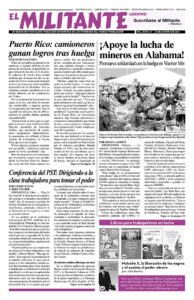Tens of thousands of protesters rallied against the Lebanese government in central Beirut Aug. 4 on the first anniversary of a huge explosion that killed over 200 people, injured 7,000 and forced a quarter of a million from their homes. They demanded those responsible be held to account.
Security forces fired tear gas and rubber bullets as protesters tried to enter the heavily barricaded downtown area.
The massive detonation occurred after 2,750 tons of ammonium nitrate caught fire. Authorities stored the highly flammable material in a port warehouse near densely populated areas for six years. No evacuation warnings were issued when the fire started.
“We don’t want any politician who is responsible for this blast to be in the government,” Tatiana Hasrouty, whose father was killed in the explosion, told Al Jazeera.
“Until now, we have nothing because they are not lifting immunity” from prosecution, she said. “All we can do is protest, let them fear us more.”
Reflecting demonstrators’ anger toward the government, a huge banner hung over five floors of a nearby high-rise. It read, “Here starts your end and our beginning.”
Shortly after the blast the government resigned. The Lebanese rulers have been unable to overcome differences to put together anything more than caretaker administrations since.
Hezbollah, with a powerful militia backed by the rulers of Iran, is part of the Lebanese government. It has used Beirut’s port to store weapons it receives from its sponsors in Tehran. The Iranian rulers have intervened across the Middle East to extend their counterrevolutionary influence, targeting rival Arab regimes and threatening to destroy Israel.
Working people and youth in Lebanon have joined mass anti-government protests since October 2019, demanding jobs, a halt to government corruption and an end to Tehran’s interference. They also called for the elimination of the sectarian political system in which parties claiming to speak for the largest religious denominations — Shiites, Sunnis and Maronite Christians — divide the top government posts among themselves. Protests have been organized across the country, including in predominantly Shiite southern Lebanon where Hezbollah is based.
Working people hardest hit by crisis
Working people have joined anti-government actions as hyperinflation has topped 400% for food and the Lebanese pound crashed to less than 10% of its former value. The price of meat is out of reach of many workers while there are severe shortages of fuel, medicines and food. Electricity blackouts are lengthening, leaving just one hour of power in most areas. The monthly minimum wage has plunged from $450 to $35.
Some from the middle classes escape the crisis by emigrating. An exodus of doctors, nurses and teachers has hit hospitals and schools. Already overwhelmed by the pandemic, hospitals now face shutdowns from extended power blackouts.
A one-day work stoppage, called by the General Confederation of Lebanese Workers with backing of some of the country’s capitalist parties, was held June 17. Union officials demanded the caretaker government halt plans to cut subsidies on essential goods.
Hezbollah launches rocket attack
Hezbollah launched 19 rockets at Israel Aug. 6. Three fell back into Lebanon, 10 were shot down by Israel’s Iron Dome anti-missile defense system and the rest landed on open ground in Israel’s north.
In a meeting with Hezbollah Deputy Secretary-General Naim Qassem, Iranian President Ebrahim Raisi welcomed the assault on Israel.
The Israeli military retaliated with a round of artillery fire and airstrikes directed at rocket launch sites in uninhabited areas of Lebanon, the first such air attack there since 2014. There were no injuries on either side.

